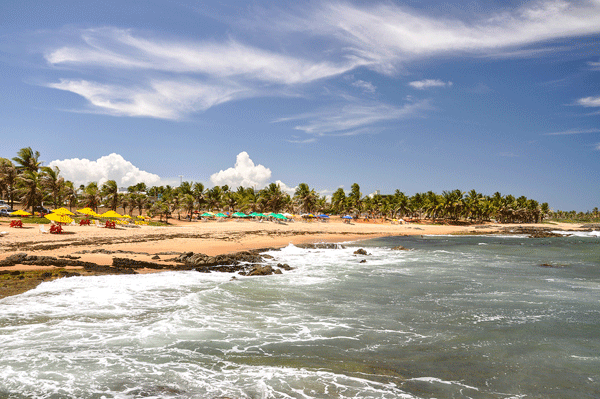Cost of Living in Praia da Pipa
Summary: If you're moving to Praia da Pipa, understanding the the cost of living in Praia da Pipa helps you know what to expect when it comes to apartment or house hunting, grocery shopping, transportation, dining out, utilities and more.

| Apartment Rentals | Apartment rentals in Praia da Pipa range from R$500 to R$2,000 per month, depending on the size and location of the apartment. The average cost of a one-bedroom apartment is around R$1,000 per month. |
| Apartment Purchases | The cost of purchasing an apartment in Praia da Pipa varies greatly depending on the size and location of the property. Prices range from R$100,000 to R$1,000,000. The average cost of a one-bedroom apartment is around R$400,000. |
| Transportation | Public transportation in Praia da Pipa is relatively inexpensive. A single bus ticket costs R$2.50 and a monthly pass costs R$50. Taxis are also available and the cost of a ride is around R$15. |
| Groceries | The cost of groceries in Praia da Pipa is relatively low. A loaf of bread costs around R$3, a liter of milk costs around R$3, and a dozen eggs costs around R$5. Prices may vary depending on the store. |
| Restaurants | The cost of eating out in Praia da Pipa varies greatly depending on the type of restaurant. A meal at a fast food restaurant costs around R$15, while a meal at a mid-range restaurant costs around R$50. Prices may vary depending on the restaurant. |
| Utilities | The cost of utilities in Praia da Pipa is relatively low. The average cost of electricity is around R$100 per month, while the average cost of water is around R$50 per month. Prices may vary depending on usage. |
| Private School Tuition | The cost of private school tuition in Praia da Pipa varies depending on the school and the grade level. Preschool tuition costs around R$1,000 per month, elementary school tuition costs around R$1,500 per month, middle school tuition costs around R$2,000 per month, and high school tuition costs around R$2,500 per month. Prices may vary depending on the school. |
Monthly Budget for Retirees in Praia da Pipa
"The cost of living in Praia da Pipa is generally considered to be average, with prices similar to what you would find in other popular tourist destinations in Brazil. However, accommodation can be quite expensive as most of the luxury villas and resorts in the area come with steep price tags," said one expat living in Praia da Pipa.
"The cost of living in Praia da Pipa, is relatively affordable compared to larger cities in the country. Rent for a one-bedroom apartment in the city center is moderately priced, while utilities and internet services are also reasonably priced. Eating out at local restaurants can be quite inexpensive, and groceries are generally affordable as well. Public transportation is also reasonably priced, and the cost of gasoline is comparable to other parts of Brazil. Overall, the cost of living in Praia da Pipa is attractive for those looking for a more laid-back and budget-friendly lifestyle," wrote a member in Praia da Pipa.
Can I live in Praia da Pipa on $1,500 a month?
"I've been living in Praia da Pipa for a while now, and I can tell you that it's definitely possible to live comfortably on $1,500 a month, but you'll have to make some adjustments to your lifestyle. First, you'll need to find a more affordable neighborhood to live in. I'd recommend looking into areas like Cabeceiras or Tibau do Sul, which are a bit further from the main tourist areas but still have a nice local vibe and are more budget-friendly.In terms of housing, you'll probably have to settle for a smaller apartment or a shared living situation to keep your rent costs down. You can find decent one-bedroom apartments for around $400-$500 a month, but if you're willing to share with roommates, you can cut that cost in half.As for utilities and internet, they can be a bit pricey, especially if you're used to high-speed connections and unlimited data plans. You might have to downgrade your internet package and be more mindful of your electricity and water usage to stay within your budget.Eating out can also be a bit expensive in the more touristy areas, so I'd recommend cooking at home as much as possible and exploring the local markets for fresh produce and ingredients. You can still enjoy the occasional meal out, but try to stick to more local, less touristy spots where the prices are more reasonable.Transportation is relatively cheap, especially if you use public buses or shared vans (called "vans" or "topicos") to get around. Owning a car can be expensive due to high import taxes and fuel costs, so I'd recommend relying on public transportation or even renting a bike to get around.Finally, you'll have to be mindful of your entertainment and leisure expenses. Going out for drinks or participating in tourist activities can add up quickly, so try to find more budget-friendly options like free or low-cost events, spending time at the beach, or exploring the beautiful nature in the area.Overall, it's definitely possible to live comfortably in Praia da Pipa on $1,500 a month, but you'll have to be more conscious of your spending and make some sacrifices in terms of housing, utilities, and entertainment," commented an expat living in Praia da Pipa.
Can I live in Praia da Pipa on $3,500 a month?
"I've been living in Praia da Pipa for a while now, and I can tell you that it's definitely possible to live comfortably on $3,000 a month, even if you're used to modern amenities. However, you might have to make a few sacrifices to make it work. For example, you might not be able to dine out at fancy restaurants every night or live in the most luxurious apartment, but you can still enjoy a good quality of life.When it comes to finding a place to live, I'd recommend looking for an apartment or house in a more affordable neighborhood like Tibau do Sul or Cacimbinhas. These areas are still close to the beach and have a nice community vibe, but the cost of living is lower than in the more touristy parts of Pipa. On the other hand, I'd avoid neighborhoods like Praia do Amor or the main street of Pipa, as these areas tend to be more expensive due to their popularity with tourists.In terms of daily expenses, you'll find that groceries and local transportation are quite affordable. However, if you're used to shopping at high-end supermarkets or taking taxis everywhere, you might need to adjust your habits a bit. Try shopping at local markets for fresh produce and using public transportation or walking to get around. This will not only save you money but also give you a more authentic experience of living in Brazil.As for entertainment and leisure activities, there are plenty of affordable options in Pipa. You can enjoy the beautiful beaches, go for hikes in the surrounding nature reserves, or take part in local cultural events. However, if you're used to spending a lot on high-end entertainment like exclusive clubs or expensive spa treatments, you might need to cut back on these activities to stay within your budget.Overall, living in Praia da Pipa on $3,000 a month is definitely doable, but you'll need to be mindful of your spending and make some adjustments to your lifestyle. By choosing a more affordable neighborhood, shopping at local markets, and enjoying the many free or low-cost activities available, you can have a comfortable and enjoyable life in this beautiful Brazilian beach town," said one expat living in Praia da Pipa.
Can I live in Praia da Pipa on $5,000 a month?
"I've been living in Praia da Pipa for a while now, and I can tell you that it's definitely possible to live comfortably on $5,000 a month, even if you're used to modern amenities. Of course, you might have to make some sacrifices, but overall, it's a great place to live.First of all, you'll want to find a place to live that's within your budget. There are some more expensive neighborhoods, like the ones closer to the beach, but you can find more affordable options if you're willing to live a bit further from the water. I'd recommend looking for a place in the neighborhoods of Cabeceiras or Sibaúma, as they tend to be more affordable and still offer a good quality of life.As for the sacrifices you might have to make, you'll probably find that some of the modern amenities you're used to might not be as readily available here. For example, high-speed internet can be a bit spotty in some areas, and you might not have access to all the same streaming services you're used to. However, there are plenty of local options for entertainment, like the beautiful beaches and vibrant nightlife, so you might not miss those things as much as you think.Another thing to consider is that while there are plenty of restaurants and bars in Praia da Pipa, you might find that the selection of international cuisine is a bit limited. However, the local food is delicious, and you can always cook at home if you're craving something specific.In terms of transportation, you might have to rely more on public transportation or walking, as owning a car can be expensive due to import taxes and high gas prices. However, the public transportation system is pretty reliable, and the town is small enough that you can walk to most places.Overall, I think you'll find that living in Praia da Pipa on $5,000 a month is definitely doable, and you'll be able to enjoy a comfortable lifestyle with just a few minor adjustments. The beautiful surroundings and laid-back atmosphere more than make up for any sacrifices you might have to make," commented an expat living in Praia da Pipa.
About the Author
 Betsy Burlingame is the Founder and President of Expat Exchange and is one of the Founders of Digital Nomad Exchange. She launched Expat Exchange in 1997 as her Master's thesis project at NYU. Prior to Expat Exchange, Betsy worked at AT&T in International
and Mass Market Marketing. She graduated from Ohio Wesleyan University
with a BA in International Business and German.
Betsy Burlingame is the Founder and President of Expat Exchange and is one of the Founders of Digital Nomad Exchange. She launched Expat Exchange in 1997 as her Master's thesis project at NYU. Prior to Expat Exchange, Betsy worked at AT&T in International
and Mass Market Marketing. She graduated from Ohio Wesleyan University
with a BA in International Business and German.
Some of Betsy's articles include 12 Best Places to Live in Portugal, 7 Best Places to Live in Panama and 12 Things to Know Before Moving to the Dominican Republic. Betsy loves to travel and spend time with her family. Connect with Betsy on LinkedIn.




